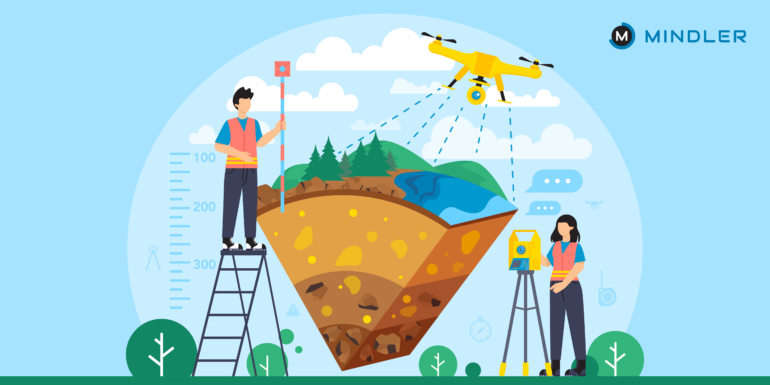Introduction
Taken science stream in class 12, but not interested in traditional careers in science? Worry not, as doctors and engineers are not at the end of their best careers. In the new digital age, where environmental concerns are driving company policies, knowledge of the earth’s composition, ecological changes, and the impact of human activities are highly desirable. As every organisation, both public and private, is working towards sustainability goals, geologists are highly sought after. This blog explores the less-known career in geology and geology jobs that can be exciting and lucrative for the right candidate.
Career Options in Geology Beyond Fieldwork
When someone thinks of geology, they naturally think about fieldwork in rugged terrains, hammering away rocks and picking at fossils. Geology is much beyond mining oil and gas exploration. The vast and ever-evolving field offers non-traditional career paths for those who want to work in innovative fields. The new-age careers are diversified and have greater potential for growth.
With a bachelor’s degree in geology, you can work in fields like resource management, climate change, sustainable development, etc, to network and collaborate with experts. You will have more options for travel and research. To become a most wanted geologist, be prepared to learn the latest analysis and interpretation tools.
Organisations look for critical thinking, communication, and data analysis skills in geologists. Remote sensing and GIS tools are widely used to analyse environmental data and generate reports. The goal of geologists is to translate complex geological concepts to the key stakeholders and decision-makers. Crucial climate decisions and ecological sustainability strategies can be devised only based on the geologist reports.
Career in geology falls into the following categories:
-
- Corporate – Oil, mining, environmental engineering
- Nonprofit organisations – Ecological planning
- Government – Local and regional planning, state and central government survey agencies, environmental regulation and protection agencies
- Academic – Colleges and universities
- Research – Research assistance and research scholars
- Entrepreneurs – Exploration geologist, hydrogeologist, geotechnical assessments
The top recruiters for geologist job opportunities are:
- Geological Survey of India (GSI)
- Central Ground Water Board (CGWB)
- Indian Bureau of Mines (IBM)
- Hindustan Zinc Ltd
- Coal India
- Minerals and Metals Trading Corporation (MMTC)
- Indian Space Research Organisation (ISRO)
- Bharat Petroleum Corporation Limited (BPCL)
- Oil and Natural Gas Commission (ONGC)
- Mineral Exploration Ltd.
- Shell
- Schlumberger
- Cairn Energy India
Career Pathways for Job After BSc Geology
Even though a career in geology is unconventional, it doesn’t mean that it is easy or less competitive. In a focused career such as Geology, you must be prepared to work in different types of conditions and grab on geologist opportunities that come your way. A basic B.Sc in Geology will only give you the basic knowledge to do fieldwork. High-paying jobs, including government jobs after B.Sc. Geology is open only for candidates who complete their master’s. In such positions, you are required to have a detailed understanding of the job.
In the academic sector, you need to complete a PhD to become a respected Geology professor. But what kind of job after Bsc geology should you be looking for? Be prepared to spend several years studying and researching to get into a good PhD program that will help you secure tenure in one of the respected universities.
Some of the career opportunities for geologists are:
- Geologists – Decipher geological processes are studying the earth’s history and physical composition.
- Mineralogists – Identify new resources and explore the formation of minerals and minerals systems.
- Palaeontologists – Study fossils to uncover evolutionary information about plant and animal life.
- Stratigraphers – Explore layering and stratification of rocks to understand the earth’s surface processes.
- Sedimentologists – Investigate commercially significant sediments and deposits through knowledge of the composition, history, and distribution of sediments.
- Geophysicists – Study the earth’s gravitational field motions and investigate earthquake-related phenomena to understand the geodynamic processes.
- Petroleum geologist – Analyse geographical data to locate oil and gas reservoirs, assess economic viability, and plan extraction methods.
- Mining geologist – Discover mineral resources and evaluate their quantity and quality for mine planning.
- Geochemists – Navigate the chemical elements in earth materials and groundwater to understand the processes that determine compositional characteristics.
- Volcanologists – Embark on an adventurous path to study volcanic events and volcanoes to predict the possibilities of eruption and assess the unknown risks.
- Hydrologists – Study the makeup, amount, physical characteristics, and other attributes of groundwater and surface water for land and resource management.
- Oceanographers – Work on seas and coastal waters to gather critical data pertaining to biological evolution, coastal processes, climate channels, and oceanic circulation patterns.
- GIS Specialist – Become an expert in using Geographic Information Systems (GIS) to visualise and analyse geological data for urban planning, environmental assessment, and resource management.
- Energy Specialist – Be a part of geothermal energy projects to identify suitable locations for geothermal plants’ renewable energy plans like wind, solar, hydrogen, etc.
- Astrogeologist – Look beyond the earth and study the planetary bodies to delve deeper into the formation and evolution of life.
A geologist perceives the world in multiple dimensions. Getting a bachelor’s degree in geology opens up numerous opportunities. You can prepare for government jobs after a BSc in geology. If research-oriented jobs are your preference, pursue a master’s degree in a field of interest. Many geologists work as consultants, helping businesses to achieve their sustainability goals.
Conclusion
Even though it is uncommon, a career in geology is diverse and challenging. A few years ago, geologists could only get jobs in oil and gas or mining companies. Now, there are many environmental consulting firms, geotechnical engineering firms, research institutions, various Govt. jobs after B.Sc geology, and renewable energy companies that continuously look for experienced geologists. Across sectors, geologists can get rewarding and fulfilling opportunities that will enable them to make a difference in people’s lives.
Want to explore some of the non-traditional careers? Get in touch with Mindler experts to discover how to build a successful career in geology that is lucrative and challenging.








